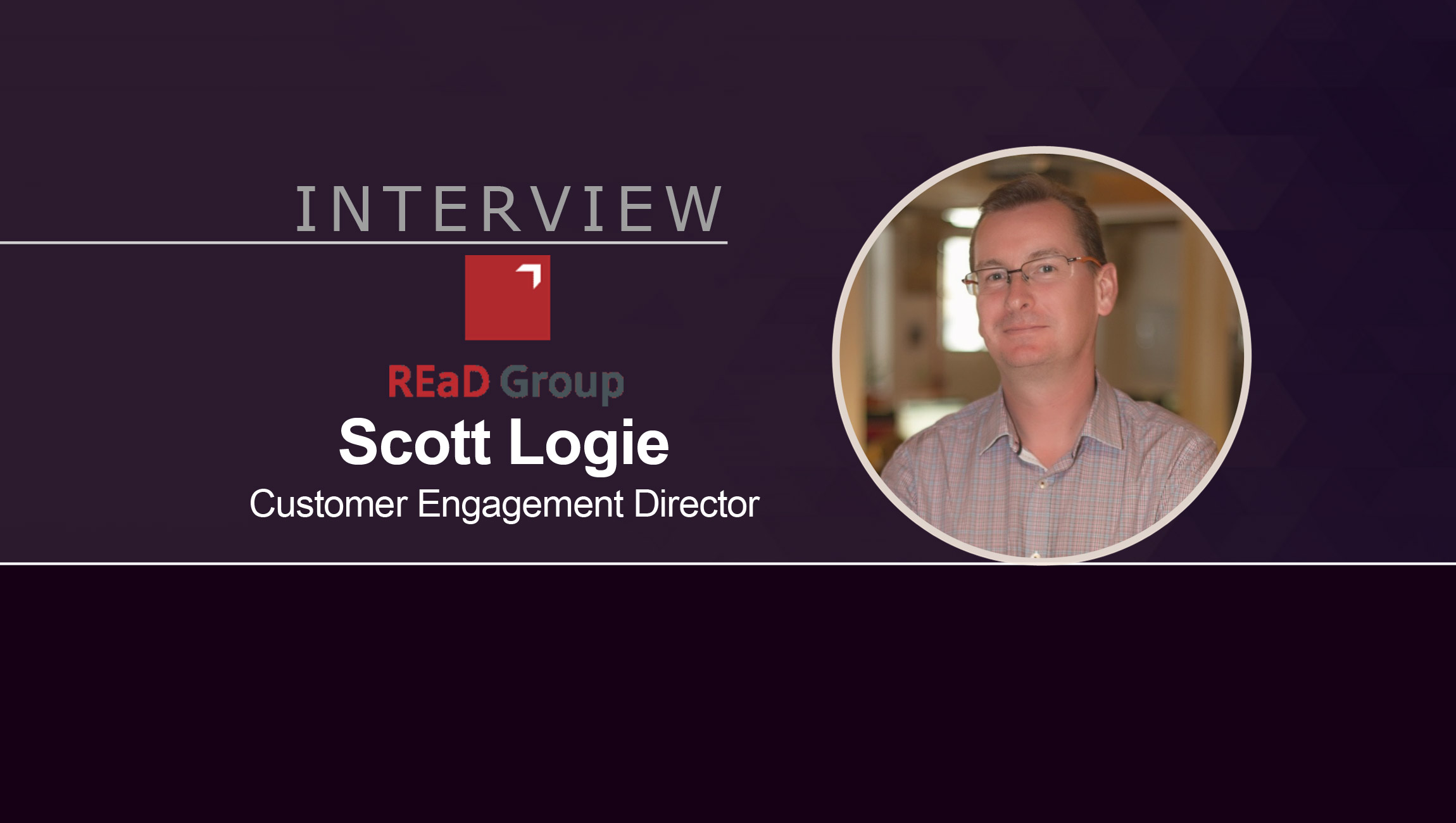Scott Logie, Customer Engagement Director at REaD Group joins us to talk about the blurring lines between research and insights in today’s marketing world while sharing a few top of mind marketing tips to draw on:
_______
Welcome to this martech chat Scott, tell us more about REaD Group and your role?
REaD Group is the UK’s most trusted data and insight businesses. We help our clients make the most of the data they hold on their end customers and provide the information and understanding to recruit cost effectively and develop profitable long-term relationships. In short, we solve marketing problems with data.
My role, as Customer Engagement Director, is to run sales and marketing but also to hopefully understand our clients’ marketing strategies and provide the advice and approach to help them achieve their goals.
Marketing Technology News: MarTech Interview with Adam Cason, Vice President, Global and Strategic Alliances at Futurex
We’d love to hear your thoughts on the current top trends in customer insights and behavior trends that marketers are especially trying to now capitalize on.
Luckily, there are always developments in our world. Nothing stands still for too long. Right now, the main thing is the impact of COVID on data-based marketing (increase in offline activity, more focus on customer data – both cleanliness and better use of insight) as well as the impact on ways of working and communication.
In the insight world, another trend is the increased use of machine learning, tending towards AI; while this makes the automation of models much better it can add complexity so needs to be managed.
The blurring of lines between research and insight is interesting (I think) creating much closer working relationships between agencies of different backgrounds and more use of attitudinal, and what would be considered “softer”, less factual data combined with deeper behavioural data.
In general, in the data world, increased automation and the need to allow smaller companies to act like bigger ones is interesting because it presents opportunities for a much wider market for providers if they can crack this.
And finally, the continuation of the building of the bridge between online and more traditional channels, hence this partnership with InfoSum and why that is important to us at REaD Group.
In what ways do you feel marketing teams need to use better tools and data to further breakdown their customer behaviors and intentions to be on top of future (predicted) outcomes?
As a data business, I am going to focus on the data side of things rather than the tools. Our view is that the more you know about a consumer then the better and more relevant your marketing will be. Clearly the behaviour they share with your brand is vital – maybe even the single most important thing. However, there is so much more data and information than can be added to enhance the internal behavioural data: for example, social media data from open social sites, motivational data from research and models, and demographic and lifestyle data from third parties.
There is no doubt that some, if not all, of these data points can enhance the knowledge of a consumer group and their probability to do certain things in the future. In addition, these extra variables can be incredibly useful for tailoring content and curating customer journeys.
What are some of the marketing technologies and customer engagement tools that you feel should now be part of the typical martech stack for today’s B2B marketers?
An area we are particularly interested in is the matching and linking sphere. Many organisations struggle to join activity to identity. As such, any data and tech combination that can take IP address, mobile number, or email address and resolve that to find the person behind the contact details and then enhance what is known about them is very exciting. Knowing someone is just about to move to a new house based on their physical address is interesting and quite commonplace, but to be able to do this just from their mobile number adds a whole new level of potential engagement opportunities.
Marketing Technology News: MarTech Interview with Vladimir Pintea, Head of Open Banking Gateway at Salt Edge
InfoSum provides the opportunity of three-way connections between contact pools for brands, via linking spines to further data pools to help enhance identity. This opens up a massive amount of opportunity for brands who simply don’t know every much about their customers other than what they do with them.
What are some of the biggest lags that you are still seeing in B2B data and marketing data trends today? A few best practices to help solve this?
B2B has always been seen to be secondary to B2C data. The overall volume of data is much lower, the data points held generally less interesting and the quality of data not as good. As such it has always been difficult to really exploit B2B data in the same way, as has been the case for consumer data.
An interesting trend in the B2B world is location. As more and more people work at home, being able to identify and connect with an individual in a business is much harder. For example, if a company tracks who visits their website, in the past that would generally be an IP address of a business, and there are providers who can create a look-up to allow that information to be known and followed up on.
Now, as individuals work at home and the IP address is a personal one then the use of consumer matching to find the email or phone number of that individual comes into play. As such, I think the blurring of lines between B2B and B2C data is likely to happen in the future and, again, creates a role for linkage in the B2B space that probably wouldn’t have been the case previously.
Of course that then creates more issues around contactability and permissions but I also think the B2C space is better placed than B2B in that area.
A few predictions that you have for the future of martech?
As we come out of the pandemic, we are likely to see sectors that have been in hiatus becoming active, more channels starting back up and a continued focus on the end customer. Longer term – more progress towards customer-centric marketing and the blurring of channel specific campaigns. That’s my dream anyway!
The only way that this can really happen is for there to be more martech that allows the execution of campaigns across multiple channels. Many claim to do this, but not many actually deliver. For me, the challenge is twofold: one, getting the channels connectors deployed so that when a campaign goes live the media is engaged easily; and two, that permissions are managed across consumers so that the blockers to allow this to happen can be removed. For me that is why walled gardens, secure bunkers, whatever we call them are vital, to ensure that data is shared safely and securely to allow multiple channel engagements to take place.
A few takeaways for marketing leaders in 2021: books they should read, brand studies they should refer to, etc?
As someone who spends a lot of time working with the Data and Marketing Association (DMA), it would be remiss of me to not mention their Customer Engagement Campaign. There is a wonderful set of research, case studies and content on the website to help any brand build longer term loyalty from their customers.
Marketing Technology News: Critical Event Management (CEM) Leader Everbridge Completes Acquisition of xMatters to Accelerate…

REaD Group is a marketing data and insight company that gives brands the right to be personal. Data – particularly quality data and data quality – is at the heart of everything it does: REaD believes that there isn’t a marketing challenge that data cannot solve.
To genuinely engage customers, brands must create communications that are timely, relevant and permissioned. REaD uses its unrivalled data products, insight and expertise to helps its clients get closer to their customers, offering market-leading data quality and cleaning solutions and trusted marketing data.
Scott Logie is Customer Engagement Director at marketing data and insight company REaD Group and Chair of the Customer Engagement Committee of the DMA (Data & Marketing Association).
Scott has been a stalwart of the direct marketing industry for the last two decades, as well as being Chair of the Direct Marketing Association for four years. He has been at REaD Group now for just over three years but that is a drop in the ocean compared to the 25 years plus in the data industry with CACI, setting up Marketing Databasics, Bank of Scotland and then running Occam for a number of years.
The role of the Customer Engagement Director is to ensure that REaD Group understands the key changes in the markets we operate in, how these changes affect our clients, their short and medium term requirements and to design solutions and products to meet these needs. To do this requires a lot of networking, engaging with partners and suppliers as well as spending as much time as possible with the end clients themselves.











